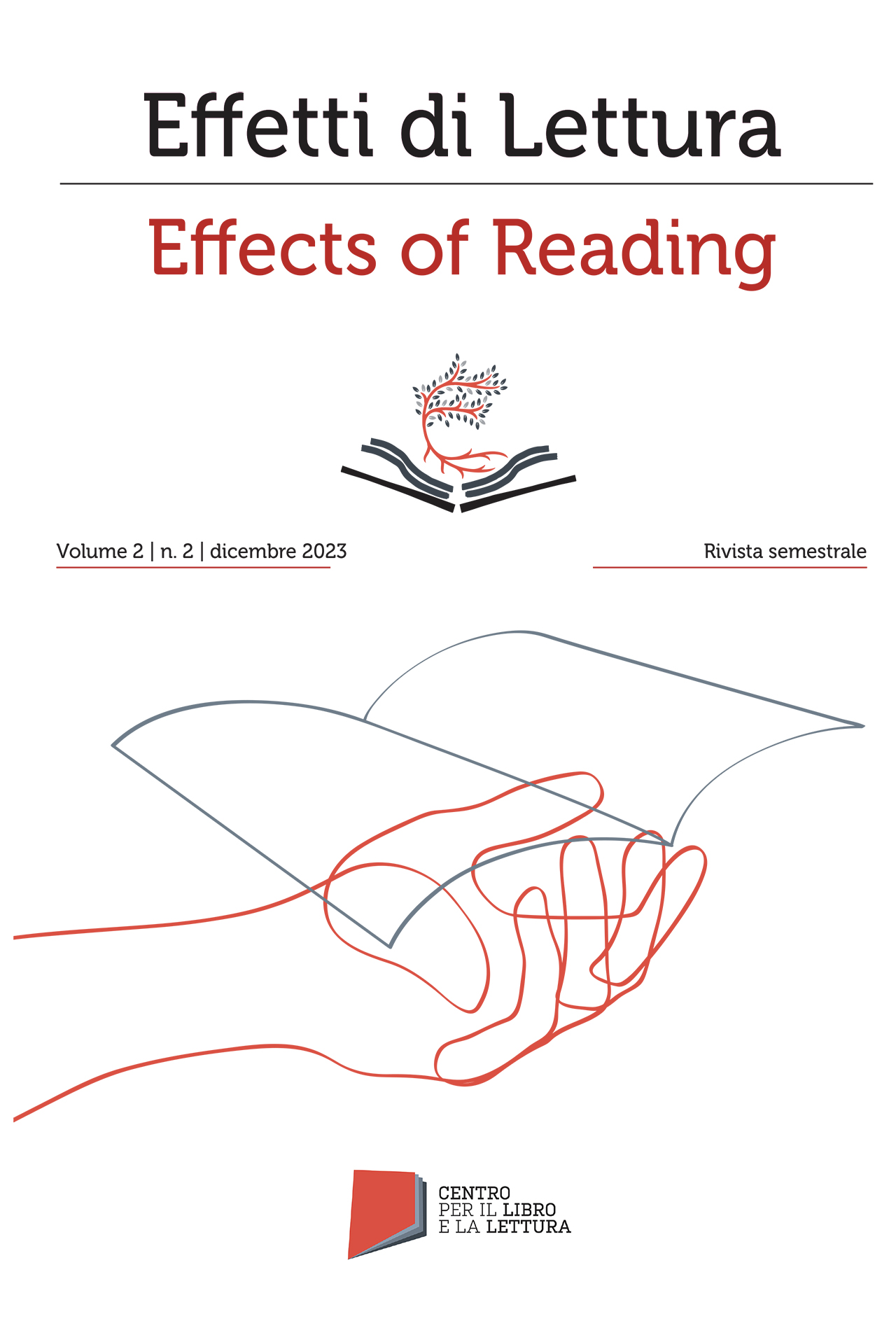Reading and libraries at school: how to transform our pupils into readers for all the life long
DOI:
https://doi.org/10.7347/EdL-02-2023-03Keywords:
lifelong readers, school libraries, educationAbstract
When we talk about youth reading in informal contexts, the most widespread sensation is that today’s adolescents and children don’t read anymore.
This statement rather rooted in a school context is misleading. I point out, first of all, about the use of the adverb anymore, which implies that actually today’s young people are those who don’t read, when instead they were used to, in the old times.
People’s thought inevitably runs to the use/abuse of new technologies undoubtedly the diffusion of the digital technologies have been capturing the new generations’ attention, in a pervasive and totalizing way.
But is it really the case to attribute to the digital all the responsibilities? In this way we would never finish to remove these responsibilities from the whole world tied to the education of children and boys (families, schools, libraries, etc.)?
This contribute has got as object the role of schools and the strategies which teachers and school managers should use to start a serious course of education to the reading which are different from the sporadic activities of promotion itself, which are always useful, but noway functional to transform our pupils to readers for the life long, and to offer them some skills capable to take them a deep understanding of a text.
We will tell how we were able to make pupils of a comprehensive institute of Altofonte, a small country land, in province of Palermo, fond of reading.
Classrooms are full of potential readers and the school must to employ all the capable strategies to transform their reading into a personal art.
Downloads
References
Atwell, N., & Atwell Merkel, A. (2022). La zona di lettura. Come aiutare i ragazzi e le ragazze a diventare lettori abili, appassionati, abituali, critici. QdR Didattica e letteratura, 15. Loescher.
Atwell, N. (2015). In the Middle. A lifetime of Learning About Writing, Reading and Adolescents. Heinemann.
Batini, F. (2018). Leggimi ancora. Lettura ad alta voce e Life Skills. GiuntiScuola.
Becchi, E., & Julia, D. (a cura di), (1996). Storia dell’infanzia. Dal Settecento a oggi (vol. 2). Editori Laterza.
Blezza Picherle, S. (2009). Nuovi orizzonti per la promozione della lettura. Il Pepeverde (Letture e letterature per ragazzi), 39, 24-28.
https://www.bibliotecaquarantottigambini.it/wp-content/uploads/2016/04/Promozione-lettura.pdf
Blezza Picherle, S. (2014). Tratto da: S. Blezza Picherle, Formare lettori, promuovere la lettura. Riflessioni e itinerari narrativi tra territorio e scuola. FrancoAngeli, Milano 2013 (nuova ed. 2014). http://natiperleggere.comune.trieste.it/wpcontent/uploads/2013/04/Blezza-Picherle-Letteratura-e-bisogni-umani.pdf
Blezza Picherle, S. (2015). Formare lettori, promuovere la lettura. Riflessioni e itinerari narrativi tra territorio e scuola. FrancoAngeli.
Boero, P., & De Luca, C. (2009). La letteratura per l’infanzia. Editori Laterza.
Cavadini, L., De Martin, M., & Pianigiani, A. (2021). Leggere, comprendere, condividere. Guida all’analisi del testo narrativo. Pearson Academy.
Chambers, A. (2015). Il lettore infinito. Educare alla lettura tra ragioni ed emozioni. Equilibri.
Cristiano, F. (2018). Diventare lettori. Libri e riviste d’Italia. Periodico di cultura editoriale e promozione della lettura, XIV, n.s., gennaio-dicembre, 5-7.
https://cepell.it/wp-content/uploads/2021/07/LER-2018-1234.pdf
Luperini, R. (2013). Che cosa resta da fare a noi insegnanti di letteratura? https://corsi.unica.it/pas/files/2014/03/Luperini-R.-Insegnare-la-letteratura-oggi.pdf
Pennac, D. (2013). Come un romanzo. Feltrinelli.
Poletti Riz, J., & Pognante, S. (2022). Educare alla lettura con il WRW – Writing and Reading Workshop. Metodo e strumenti per la scuola secondaria di primo grado. Erickson.
Poletti Riz, J. (2017). Scrittori si diventa. Metodi e percorsi operativi per un laboratorio di scrittura in classe. Erickson.
Report Istat produzione e lettura libri in Italia. Anno 2021. https://www.istat.it/it/files//2022/12/REPORT_PRODUZIONE_E_LETTURA_LIBRI_2021.pdf
Roncaglia, G. in Vitello, G. (Eds.), (2023). Leggere a scuola nell’era digitale. Intervista a Gino Roncaglia, Hamelin, 52, 35-55.
Downloads
Published
How to Cite
Issue
Section
License
Copyright (c) 2024 Effetti di lettura / Effects of reading

This work is licensed under a Creative Commons Attribution-NonCommercial 4.0 International License.








